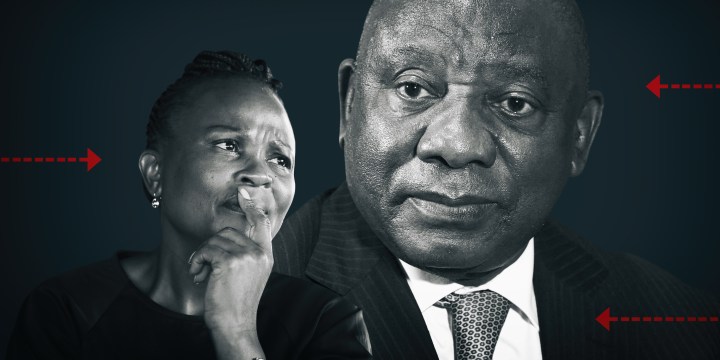AGE OF ACCOUNTABILITY
Political lawfare between Ramaphosa and Mkhwebane reaches new crescendo

The political battle disguised as lawfare between Cyril Ramaphosa and Busisiwe Mkhwebane reached fever pitch after a Western Cape High Court ruling declared the President’s suspension of the Public Protector invalid.
In South Africa a day, never mind a week, is a long time in politics. At the close of the workday on Friday, 9 September, the Public Protector’s “dream team” were all victory signs and good cheer — only to have the party pooped on almost immediately as the Democratic Alliance filed an appeal with the Constitutional Court.
On Friday, a full Bench of the Western Cape High Court comprising Judges Lister Nuku, Matthew Francis and James Lekhuleni found that President Cyril Ramaphosa had been conflicted when he made the decision to suspend Busisiwe Mkhwebane.
Initial reaction of the Dream Team just after the news broke …Thank you all for the hard work thank you all #FieldNegroes for the support…Hard luck to the others for this round..Sorry for the chest pains…(Still some way to go,but in the end victory is certain)!🙏🏾🙏🏾✊🏾✊🏾❤️❤️ pic.twitter.com/iAzXkQBDUn
— Dali Mpofu (@AdvDali_Mpofu) September 9, 2022
Ramaphosa had, said the judges, been tainted by bias when he suspended the Public Protector and had been “conflicted” at the time. The suspension, they added, might have been “retaliatory” as it had come a day after Ramaphosa had been sent questions by Mkhwebane in regards to a break-in and theft of cash from his Phala Phala farm.
Mkhwebane’s legal representatives, Seanego Attorneys, have since approached the Western Cape High Court seeking the order be enforced regardless of appeals or challenges. Mkhwebane has accused the DA of attempting to “prevent me from resuming my duties”.
The Western Cape division, bear in mind, is still headed by Judge President John Hlophe, who has been found guilty of gross misconduct and who the Judicial Service Commission (JSC) has recommended be suspended by the President.
This was in July 2022, two months ago, but Ramaphosa has unfathomably failed to act while Hlophe filed an application in the Gauteng High Court in August to have the imminent suspension, as well as the decision to impeach him, set aside.
No good deed goes unpunished, however.
On 5 September, five days before Mkhwebane’s victory, Hlophe presided over a short hearing dismissing the State’s request for leave to appeal against Hlophe’s acquittal of former State Security Minister Bongani Bongo, on charges of corruption.
The State has since indicated it will approach the Supreme Court of Appeal with regard to Hlophe’s ruling. Bongo had been accused of offering a bribe to advocate Ntuthuzelo John Vanara, evidence leader of Parliament’s 2017 Eskom Inquiry.
Bongo was also implicated at the Zondo Commission — alongside former State Security Agency Director-General Arthur Fraser — for attempting to remove former Inspector-General of Intelligence Setlhomamaru Dintwe from his position.
Bongo, according to Dintwe, had attempted to leverage a legislative approach to negate his oversight powers, whereas Fraser had attempted to “hound” Dintwe with “unfounded and illogical accusations”.
Visit Daily Maverick’s home page for more news, analysis and investigations
Keen eye on the Bench
With such high stakes in this most brutal frontier of the political discombobulation of the ANC — the courts — and in a division fraught with skullduggery and intrigue, it warrants that a keener eye be cast over the judges who made last week’s ruling in Mkhwebane’s favour
Nuku and Francis were both members of the ANC until their appointments to the Bench, Nuku in 2016 and Francis in 2021, and have been associated with Hlophe. Both acknowledged this in their JSC interviews.
Nuku was Hlophe’s instructing attorney in the Judge President’s challenge to what has now been found to be impeachable conduct in his attempt to influence Constitutional Court judges in a matter involving Jacob Zuma.
During his interview with the JSC, Francis revealed that Hlophe had lectured him at the then University of Natal and that they had previously worked together.
They lost contact until Francis popped into Hlophe’s office two decades later in 2018 to “pay respects”. They had since become friends and he “valued” that friendship, Francis informed the JSC in 2021.
Francis’s repeated appointment as acting judge by Hlophe was also the subject of a complaint to the JSC by Deputy Judge President Patricia Goliath in 2o20, although he was not named.
Lekhuleni was appointed in 2022 and is a former acting president of the Western Cape Regional Court. Before his appointment, while an acting judge, Lekhuleni dealt with the legally complex African Transformation Movement v Speaker of the National Assembly matter.
The African Transformation Movement (ATM) had sought to overturn the Speaker’s decision to deny a secret ballot in a motion of no confidence in then President Zuma.
Lekhuleni found that the High Court did have jurisdiction to review the Speaker’s decision and dismissed the ATM’S case. The Supreme Court later overturned Lekhuleni’s judgment.
It was the ATM — part of the RET sect that, along with the EFF, supports Mkhwebane — that was quick off the mark to welcome the high court judgment while at the same time condemning the DA for its “abuse of the courts” and for what it described as an attempt “to frustrate” the reinstatement of Mkhwebane.
Drawing swords
What we do know now is that the news of the court victory arrived with a ripple of excitement while advocate Dali Mpofu, representing Mkhwebane at her Section 194 impeachment inquiry, was cross-examining a witness. A short break was taken.
It appears Mkhwebane decided to immediately get back in the saddle and return to the office, but acting Public Protector Advocate Kholeka Gcaleka, was having none of it. She wrote to Mkhwebane on the same evening, stating “your earlier WhatsApp communication to arrange access to the premises of the Public Protector has reference”.
Gcaleka, who is keeping the Phala Phala investigation hot potato to herself for now, reminded Mkhwebane that a direct appeal to the Constitutional Court had been lodged and that “the High Court order is not presently operative and your suspension from the position of Public Protector remains effective”.
Mkhwebane’s 194 impeachment hearing, will, in the meantime, continue this week.
With characteristic sang-froid, the President’s office said it “noted” the judgment and was “seeking guidance from the Constitution on the next steps”.
The moving parts that make up the lumbering and limping beast of ANC factionalism and its effects on the law and the country’s courts is a thing to behold.
The party’s untidy, absurd, and occasionally violent unravelling in full view of the citizens and in the courts somehow conjure verses of the old English nonsense rhyme to mind.
One fine morning in the middle of the night,
Two dead men got up to fight,
Back to back they faced each other,
Drew their swords and shot each other. DM














 Become an Insider
Become an Insider
Well done DA! Your prompt action was pivotal to this matter.
This is a very sad article that seeks to tell the readers that do not expect the judgements that the writer of the article wants as long as Hlophe is the Judge President of the Western Cape. The author is casting aspersions on the judiciary to advance a particular narrative. The objective facts do not matter and the principles of unbiased reporting are trampled with gay abandon. Seanego Attorney are instructing attorneys of the Public Protector and are paid by that office as Gcaleka said on Friday! Mkhwebane has no problem with Gcaleka as the article seeks to allude. The Seanego attorneys informed the Acting Public Protector that the DA appealed the matter therefore suspending the operative part that says the judgement is effective from the 9th of September. This is the common law part that if not appealed would have made the judgement effective.
The DA despite its letter that the judgement can only be effective when confirmed by the Constitutional Court realised that it might not be so and quickly filed an appeal. Hence the Public Protector has filed for the enforcement of the judgement. The direct appeal to the Constitutional Court is to avoid the cleft of having to appeal a constitutional matter to an inappropriate court as well as the risk of leaving the matter without appeal for confirmation. If theDA did not appeal, the Public Protector had a right to resume work on the second part of the judgement.
Can someone please clarify for me, why would a case involving the Public Protector be lodged in the Western Cape and not in the relevant Gauteng Division of the High Court? Could Justice Hlope be the reason?